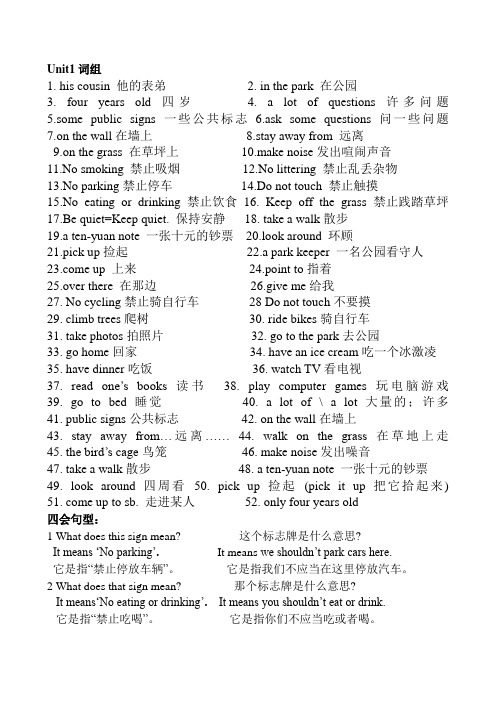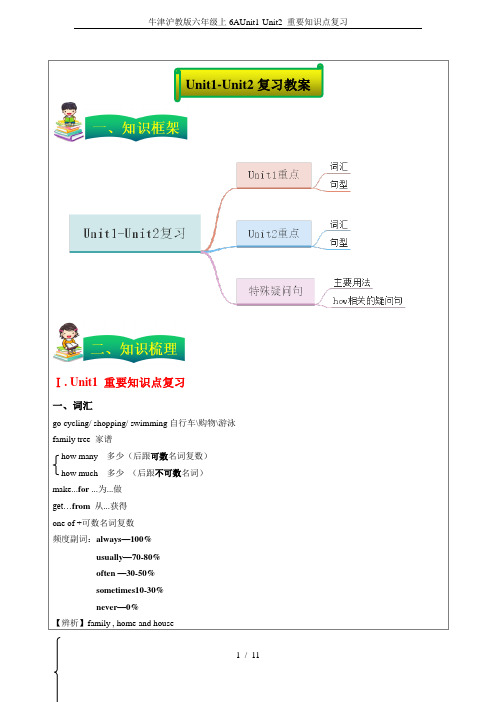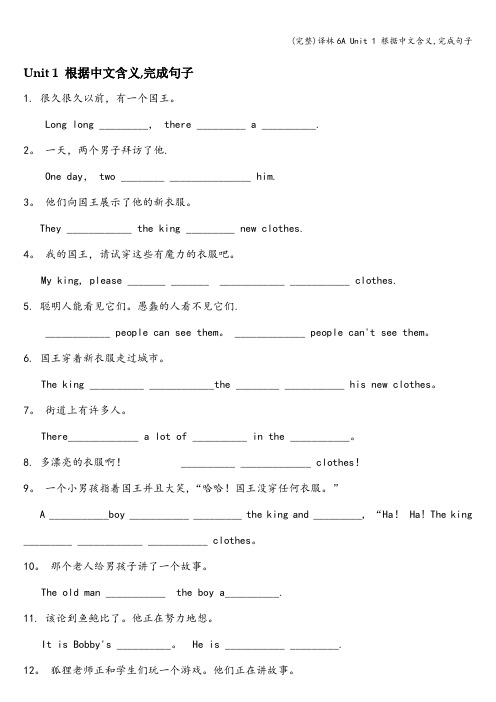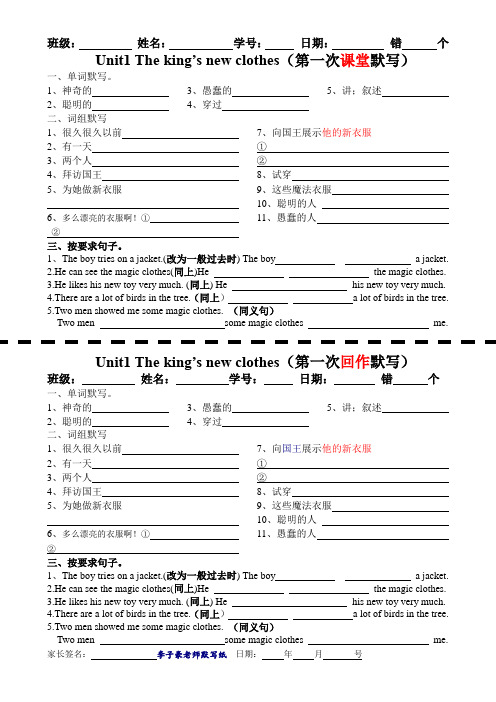6A unit1 单元总默写 -答案
- 格式:doc
- 大小:59.50 KB
- 文档页数:1

Unit1词组1. his cousin 他的表弟2. in the park 在公园3. four years old四岁4. a lot of questions 许多问题5.some public signs一些公共标志6.ask some questions 问一些问题7.on the wall在墙上8.stay away from 远离9.on the grass 在草坪上10.make noise发出喧闹声音11.No smoking 禁止吸烟12.No littering 禁止乱丢杂物13.No parking禁止停车14.Do not touch 禁止触摸15.No eating or drinking 禁止饮食16. Keep off the grass 禁止践踏草坪17.Be quiet=Keep quiet. 保持安静18. take a walk散步19.a ten-yuan note 一张十元的钞票20.look around 环顾21.pick up捡起22.a park keeper 一名公园看守人e up 上来24.point to指着25.over there 在那边26.give me给我27. No cycling禁止骑自行车28 Do not touch不要摸29. climb trees爬树30. ride bikes骑自行车31. take photos拍照片32. go to the park去公园33. go home回家34. have an ice cream吃一个冰激凌35. have dinner吃饭36. watch TV看电视37. read one‟s books读书38. play computer games 玩电脑游戏39. go to bed睡觉40. a lot of \ a lot大量的;许多41. public signs公共标志42. on the wall在墙上43. stay away from…远离…… 44. walk on the grass在草地上走45. the bird‟s cage鸟笼46. make noise发出噪音47. take a walk散步48. a ten-yuan note 一张十元的钞票49. look around四周看50. pick up捡起(pick it up 把它拾起来) 51. come up to sb. 走进某人52. only four years old四会句型:1 What does this sign mean? 这个标志牌是什么意思?It means …No parking‟.It means we shouldn‟t park cars here.它是指“禁止停放车辆”。

Unit1 The king’s new clothes一、单词辨音,判断读音是否相同,相同的打“√ ”,不同的打“×”1.long point ( ) 2. laugh afternoon ( )3. arm art ( )4. start hard ( )5. flower show ( )6. shout house ( )7. through foolish( ) 8. try party ( )二.翻译短语1.大声喊2.步行穿过3.嘲笑4.指着5.神奇的衣服6.What beautiful clothes!7.一个聪明的男生8.一位愚蠢的国王9.一天10.试穿这些有魔力的衣服三.用单词的适当形式填空1.What day _______ (be) it yesterday?2.— How _______ (be) the students? — They were very friendly.3.— ______ he _______ (have) lunch at nine? —No, he didn’t.4.There _________ (be) no one here a moment ago.5.I ___________ (call) Mike this morning.6.I listened but ___________ (hear) nothing.7、My mother ________________ (not do) housework yesterday.8.She watches TV every evening. But she _______________ (not watch) TV last night.9.________ your father ________ ( go ) to work every day last year?There ____________ a telephone call for you just now. (be)10.There __________ not enough people to pick apples that day. ( be)四.按要求改句子1. There was a king.(改成一般疑问句)2. We can make new clothes for you. (改成一般疑问句)3. The two men showed the king his new clothes.(同义句)4. city 、the 、king、walked、the、in、clothes、through、his(连词成句)5. are、a、Miss、her、playing、students、Fox、and、game(连词成句)五.阅读理解AMost English people have three names: a first name, a middle name and the family name. Their family name comes last. For example, my full name is Jim Allan Green. Green is my family name .My parents gave me both of my other names.People don’t use their middle names very much. So “John Henry Brown” is usually called “John Brown”. People never use Mr, Mrs or Miss before their first names. So you can say John Brown, or Mr Brown; but you should never say Mr John. They use Mr, Mrs or Miss with the family name but never with the first name.Sometimes people ask me about my name. “When you were born, why did your call you Jim?” they ask.” Why did they choose that name?” The answer is they didn’t call Jim. They called me James. James was the name of my grandfather. In England, people usually call me Jim for short. That’s because it is shorter and easier than James.1.Most English people have____ names.A oneB twoC threeD four2. ____ is Jim’s family name.A JimB GreenC AllanD James3. English people use Mr, Mrs or Miss with ____ .A the family nameB the first nameC The middle nameD the first name and the middle name4. The teacher’s name is Mary Joan Shute. Her students call her ____.A miss MaryB Miss JoanC Miss Mary JoanD Miss Shute5. People usually call the writer Jim instead of James because _____.A It’s the name of his grandfatherB It’s easier for people call himC It’s the name that his parents chose for himD It’s more difficult than James一.按要求写单词。

Unit1-Unit2复习教案Ⅰ. Unit1 重要知识点复习一、词汇go cycling/ shopping/ swimming自行车\购物\游泳family tree 家谱how many 多少(后跟可数名词复数)how much 多少(后跟不可数名词)make...for ...为...做get…from从...获得one of +可数名词复数频度副词:always—100%usually—70-80%often —30-50%sometimes10-30%never—0%【辨析】family , home and housefamily:“ 家、家庭、家人”。
作主语时,如果强调的是家庭成员,谓语动词用复数;如果强调的是一个家庭,则谓语动词用单数。
family tree 家谱home "家",指同家人共同生活,居住的地方,特别强调家里的氛围和环境,不一定含有建筑的意思,带有感情色彩的词。
如:hometown 故乡...house“住宅”、“房子”,指居住的房屋,建筑物。
二、语法和重点句型1. 用This is ... /These are ...来介绍家人。
二者都表示近指,“This is .. . ”后跟单数名词,“These are ...” 后跟复数名词或者多个不同的对象。
2.用how many 来询问数量后接可数名词的复数形式,当我们提问你有多少……时候,如果How many后跟人,常用how many... do you have?如果How many 后跟物,常用how many...have you got?3.What do you do with your... ? 和What else do you do with your... ? 来提问与家庭成员或亲戚一起做什么.else 意为别的其他的,常用于特殊疑问词或不定式之后,如what else, something else等。

Unit 1 根据中文含义,完成句子1. 很久很久以前,有一个国王。
Long long _________, there _________ a __________.2。
一天,两个男子拜访了他.One day, two ________ _______________ him.3。
他们向国王展示了他的新衣服。
They ____________ the king _________ new clothes.4。
我的国王,请试穿这些有魔力的衣服吧。
My king, please _______ _______ ____________ ___________ clothes.5. 聪明人能看见它们。
愚蠢的人看不见它们.____________ people can see them。
_____________ people can't see them。
6. 国王穿着新衣服走过城市。
The king __________ ____________the ________ ___________ his new clothes。
7。
街道上有许多人。
There_____________ a lot of __________ in the ___________。
8. 多漂亮的衣服啊!__________ _____________ clothes!9。
一个小男孩指着国王并且大笑,“哈哈!国王没穿任何衣服。
”A ___________boy ___________ _________ the king and _________, “Ha! Ha! The king _________ ____________ ___________ clothes。
10。
那个老人给男孩子讲了一个故事。
The old man ___________ the boy a__________.11. 该论到鱼鲍比了。

班级: 姓名: 学号: 日期: 错 个家长签名: 李子豪老师默写纸 日期: 年 月 号 Unit1 The king’s new clothes (第一次课堂默写)一、单词默写。
1、神奇的2、聪明的3、愚蠢的4、穿过5、讲;叙述二、词组默写1、很久很久以前2、有一天3、两个人4、拜访国王5、为她做新衣服6、多么漂亮的衣服啊!① ②7、向国王展示他的新衣服 ①②8、试穿9、这些魔法衣服 10、聪明的人 11、愚蠢的人 三、按要求句子。
1、The boy tries on a jacket.(改为一般过去时) The boy a jacket.2.He can see the magic clothes(同上)He the magic clothes.3.He likes his new toy very much. (同上) He his new toy very much.4.There are a lot of birds in the tree.(同上) a lot of birds in the tree.5.Two men showed me some magic clothes. (同义句)Two men some magic clothes me.Unit1 The king’s new clothes (第一次回作默写)班级: 姓名: 学号: 日期: 错 个一、单词默写。
1、神奇的2、聪明的3、愚蠢的4、穿过5、讲;叙述二、词组默写1、很久很久以前2、有一天3、两个人4、拜访国王5、为她做新衣服6、多么漂亮的衣服啊!① ②7、向国王展示他的新衣服 ①②8、试穿9、这些魔法衣服 10、聪明的人 11、愚蠢的人 三、按要求句子。
1、The boy tries on a jacket.(改为一般过去时) The boy a jacket.2.He can see the magic clothes(同上)He the magic clothes.3.He likes his new toy very much. (同上) He his new toy very much.4.There are a lot of birds in the tree.(同上) a lot of birds in the tree.5.Two men showed me some magic clothes. (同义句)Two men some magic clothes me.班级: 姓名: 学号: 日期: 错 个家长签名: 李子豪老师默写纸 日期: 年 月 号 Unit1 The king’s new clothes (第二次课堂默写)一、单词默写。

6A Unit 1 The king `s new clothes (皇帝的新装)一词组1. long long ago 很久以前2. new clothes 新衣服3. make new clothes for you 为你制作新衣服make sth for sb 为某人制作某物4. show the king his new clothes=show his new clothes to the king给皇帝展示他的新衣服show sb. sth.= show sth. to sb.给某人看某物5. try on 试穿try on the coat=try the coat ontry it on 试穿它try them on 试穿它们6. magic clothes 有魔力的衣服7. walk through步行穿过8.in his new clothes 穿着他的新衣服9. shout at sb. 对某人大叫ugh at sb. 对某人大笑11. look at 看….12. point at 指向…13. fit sb.(宾格)well 非常适合某人14.an American cowboy 一个美国牛仔wear jeans 穿牛仔裤15. a Scottish man 一位苏格兰人wear a kilt 穿苏格兰裙16.tell a story 讲一个故事tell sb. (宾格)a story 给某人讲故事17. say a/one sentence 说一句话say the next sentence 说下一句话18.on the mountain 在山上19. the next sentence 下一句话20.live in the house 住在房子里21. tell the boy a story 给这个男孩讲一个故事tell sb. sth.22. it is one `s turn 某人的机会23. think hard 努力思考24. have to 不得不have to +动原25. in front of 在….前面(外部)in the front of 在… 前面(内部)26. walk by 路过27. be nice to sb. 对某人好28. look after 照顾look after ...well=take good care of...照顾好29.turn into 变成30.a lot of people =many people 许多人二,句型1. Long long ago, there was a king. 很久很久以前,有一位国王。
Unit1 The king’s new clothes知识点梳理一、短语积累1.the king’s clothes 皇帝的新装皇帝的新装2.long long ago很久以前很久以前3.one day有一天有一天4.two men/women 两个男人/女人女人5.like new clothes喜欢新衣服喜欢新衣服6.make…for给……做7.visit the king拜访国王拜访国王8.show sth to sb show sb sth展示给……看9.try on these magic clothes 试穿这些魔力衣服试穿这些魔力衣服10.clever / foolish people聪明聪明/愚蠢的人愚蠢的人 a lot of/lots of/many people许多人许多人11.walk through the city 步行穿过这座城市步行穿过这座城市12.look at看……13.in the street在街上在街上在街上14.shout at向…..大喊大喊15.a little boy一个小男孩一个小男孩16.point at指着指着ugh at嘲笑嘲笑18.in the new clothes wear the new clothes穿着新衣服穿着新衣服穿着新衣服wear yellow穿黄色的衣服穿黄色的衣服19.fit well很适合很适合20.get…from从……得到得到e to my party来参加我的聚会来参加我的聚会来参加我的聚会22.at half past four在四点半在四点半23.an American cowboy一个美国的西部牛仔一个美国的西部牛仔24.a Scottish man一个苏格兰男人一个苏格兰男人 25.wear jeans穿着牛仔裤穿着牛仔裤wear a kilt 穿苏格兰短裙穿苏格兰短裙穿苏格兰短裙26.play a game/play games 做游戏,玩游戏做游戏,玩游戏27.tell a story/tell stories讲故事讲故事讲故事28.each/every student每一个学生每一个学生 29.say one sentence说一个句子说一个句子30.on the mountain在山上在山上31.the next sentence下一个句子下一个句子32.live in居住在居住在33.B obby’s turn博比的机会博比的机会34.WhatWhat’’s next? 接下来呢?接下来呢?35.think hard冥思苦想冥思苦想36.have to不得不,必须不得不,必须37.start …again重新开始重新开始38.in the forest在森林里在森林里在森林里39.in front of在……前面前面40.by the house房子附近房子附近41.pick a flower/pick flowers 摘一朵花摘一朵花 42.be angry 生气的生气的43.pick up捡起,拾起捡起,拾起44.give me your child把你的孩子给我把你的孩子给我把你的孩子给我 45.be nice to her(宾格)对她很好(宾格)对她很好 46.live with the lion和狮子住在一起和狮子住在一起和狮子住在一起 47.look after照顾照顾48.turn into a prince 变成一个王子变成一个王子 49.What beautiful clothes! 多漂亮的衣服啊!多漂亮的衣服啊!1 二、重点句型、语法点拔1、there be结构在一般过去时的各种句型转换:There be结构的组成:名词短语 +方位短语. 结构的组成: There be + 名词短语名词短语(数量词+名词) (1)肯定句:肯定句:e.g.: Long long ago, there was a king. / There were a lot of people in the street. (2)否定句:在be动词was或were后+not, some要改成any. e.g.: There were some people in the street.(否定句) not any people in the street. There were n ot(3) 一般疑问句及其肯定和否定回答:一般疑问句及其肯定和否定回答:Was there a house on the mountain? e.g.: A: W as’t. B: Yes, there was. / No, there wasn(4)有关there be的特殊疑问句的问答:的特殊疑问句的问答:’s house?(针对名词短语提问) A1:What was in front of the lionB1: There were some flowers . A2: How many houses were there on the mountain?(针对数量词提问)(针对数量词提问)B2: There was one. 2、动词在一般过去时中的变化:a、be动词在一般过去时中的变化:was/were.其中Checkout time中的circle and say进行了重点操练。
牛津6A Unit 1知识点整理1.1 运动类名词的单复数形式在英语中,运动类名词的单复数形式有一定的规律。
以下是一些常见运动类名词的单复数形式:•football(足球):单数形式为football,复数形式为footballs。
•basketball(篮球):单数形式为basketball,复数形式为basketballs。
•tennis(网球):单数形式为tennis,复数形式为tennises。
•swimming(游泳):单数形式为swimming,复数形式为swimmings。
•running(跑步):单数形式为running,复数形式为runnings。
需要注意的是,有些运动类名词的复数形式并不是通过在单数形式后面加s来构成,因此在学习和使用过程中需要注意这些特殊形式。
1.2 运动的介词短语运动类动词常常与特定的介词搭配使用,构成介词短语。
以下是一些常见的运动介词短语:•play football(踢足球)•play basketball(打篮球)•go swimming(去游泳)•go running(去跑步)•do gymnastics(做体操)这些介词短语为我们描述运动提供了一种简单而准确的表达方式,因此在进行运动描述时,我们需要掌握这些常用的介词搭配。
1.3 描述运动的形容词在描述运动时,我们经常使用一些形容词来表达运动的特性或效果。
以下是一些常见的描述运动的形容词:•fast(快速的)•slow(慢的)•intense(强烈的)•gentle(温和的)•strenuous(艰苦的)这些形容词能够帮助我们更准确地描述运动的特点,使我们的表达更加具体生动。
1.4 运动时的时间副词在描述运动时,有时我们需要使用时间副词来说明运动的频率或持续时间。
以下是一些常见的描述运动时的时间副词:•often(经常)•usually(通常)•sometimes(有时候)•always(总是)•for hours(几个小时)这些时间副词可以帮助我们更准确地描述运动的时间要素,使我们的表达更加完整。
6A Unit 1 The king’s new clothes重点语法1. 一般过去时一、定义:表示过去发生的动作或事件。
二、关键词:just now (刚才) a moment ago (片刻之前) ……ago (……之前)yesterday (昨天) last ……(上……) the day before yesterday(前天)三、结构:(1)含有be动词的一般过去时(is/am过去式:was / are 过去式:were )肯定句:主语+ was / were + 其它. eg : The king was happy just now .否定句:主语+ was / were + not + 其它. 否:The king was not happy just now .疑问句:Was / Were + 主语+ 其它? 疑:Was the king happy just now ?肯定回答:Yes , 主语+ was / were . 肯回:Yes , he was .否定回答:No , 主语+ was / were + not . 否回:No , he was not .eg : I ______ a student two years ago . There ______ a king long long ago .They ______ in Beijing last week . There ______ a lot of people yesterday .(2)不含有be动词的一般过去时肯定句:主语+ 动词的过去式+ 其它. eg: I played (play) football yesterday .否定句:主语+ didn’t + 动词(原形)+ 其它. 否:I didn’t play football yesterday .疑问句:Did + 主语+ 动词(原形)+ 其它. 疑:Did you play football yesterday ?肯定回答:Yes , 主语+ did . 肯回:Yes , I did .否定回答:No , 主语+ didn’t . 否回:No , I didn’t .eg : Two men _____ (visit) the king yesterday .否:Two men _____ ______ the king yesterday . Yes , they ______ .疑:_____ Two men ______ the king yesterday ? No , they ______ ______ .The king ______ (walk) through the city just now .否:The king ______ ______ through the city just now . Yes , he _____ .疑:______ the king ______ through the city just now ? No , he _____ ______ .四、动词如何变过去式(1)直接+ ed eg : play --- played walk ---- walked visit ---- visited(2)以不发音e 结尾eg : dance ---- danced like --- liked live --- lived(3)以辅音+y结尾,变y为ied eg: study --- studied(4)以辅元辅结尾,双写+ ed eg: stop--- stopped swim--- swimmed(5)不规则eg : is/am --- was are --- were go --- went become---became take --- took bring --- brought can ---- could fly ---- flew see --- sawhave---had tell---told2. (1)告诉某人某事:tell + 人+ 事情(2)告诉某人关于某事:tell + 人+ about + 事情eg: ①老师正告诉她的学生一个有趣的故事。
牛津小学英语6A Unit 1 Public signs 单元重点归纳词汇Public sign公共标志(公共标示牌) should 应该(shouldn’t=should不应该)What does the sign mean?No smoking (严禁吸烟) : It means you shouldn’t smoke here. smoke 吸烟No littering (严禁乱丢杂物): It means you shouldn’t litter here. litter 乱丢杂物No parking (禁止停放车辆): It means you shouldn’t park here. park 停车No eating or drinking (禁止吃喝): It means you shouldn’t eat or drink here.No + V-ing: No taking photos 禁止拍照 No swimming 禁止游泳Danger (危险): It means you should stay away from it. stay awayfrom 远离(不靠近)Do not touch (严禁触碰): It means you shouldn’t touch it. touch 触,碰Keep off the grass (不接近草坪): It means you shouldn’t walk on the grass. Keep off 不接近Be quiet (保持安静): It means you shouldn’t make noise. Make noise发出噪音(声响)cousin (堂,表)兄弟姐妹:uncle’s or aunt’s son or daughter always总是only 仅仅,只 four years old 四岁 a lot of questions 许多(many)问题some questions about them 有关他们(它们)的一些问题They mean different things 它们意思各不相同 on the grass 在草地上The sign on the bird’s cage在鸟笼上的标志(the boy in the green sweater穿绿毛衣的那个男孩)know a lot about public signs 对标牌了解很多(了解,知道有关很多标志的事)take a walk 散步 walk to the note 走到纸币跟前 come up to him 来到他跟前say to Mr. Smith 对史密斯先生说 fine ¥10 罚款10 元pick 捡 pick it up 捡起它(it, them 放中间)around 在….周围 Look around 环顾四周 There are some public signs around the river.point 指着 point to a sign on the grass 指着草地上的一个标志Can’t you see the sign over there, sir? 先生,你难道没看见那边的标牌吗?play the game with your friends 和你的朋友玩这个游戏suddenly 突然地 nearby 附近地(副词)quickly 快地 keeper 看守人On the Internet 在网上 learn more about public signs 学更多有关公共标志的知识Talk about the sign with a partner. 找个伙伴谈论标志 conversation 谈话As a model 作为一个样子(模型) correct words 正确的单词二、部分语言点札记1 always 总是 always > usually > often > sometimesThis boy is always late for school. 这个男孩总是上学迟到。
单词:错 (个)词组:错 (个) 句子:错 (个) 总错 (个)
家长签名: 李子豪老师默写纸 日期: 月 号 Unit1 The king’s new clothes
班级: 姓名: 学号: 日期:
一、单词默写
1、有魔力的;神奇的 magic
2、聪明的 clever
3、愚蠢的 foolish
4、穿过 through
5、讲;叙述 tell
6、每个 each
7、说 say
8、迅速的;快的quick
9、下一个next 10、小的;年幼的 little 11、机会 turn 12、想;思考 think 13、努力地;费劲地 hard 14、孩子 child 15、句子 sentence
16、大笑 laugh
17、穿 wear
18、拜访;参观 visit
19、大喊;大叫 shout
20、指着;指向 point
21、开始 start
二、词组默写
1、很久很久以前 long long ago
2、有一天 one day
3、两个人 two men
4、拜访国王 visit the king
5、为你做新衣服
make a new clothes for you 6、向国王展示他的新衣服 show the king his new clothes 7、试穿 try on 8、这些魔法衣服 these magic clothes 9、聪明的人 clever people
10、愚蠢的人 foolish people 11、一个聪明的男孩 a clever boy 12、步行穿过城市 walk through the city 13穿着他的新衣服 in his new clothes 14、许多人 a l ot of people 15、看着国王 look at the king 16、朝他大喊 shout at him 17、一个小男孩 a little boy 18、指着国王 point at the king 19、嘲笑他 laugh at him 20、非常合身 fit well 21、来参加我的派对 come to my party 22、在四点半 at half past four 23、在街上 in the street 24、一位美国牛仔 an American cow boy 25、一位苏格兰男士 a Scottish man 26、穿着一条苏格兰裙 wear a kilt 27、玩一个游戏 play a game
28、讲一个故事 tell a story
29、每一位学生 each student
30、说一个句子 say a sentence
31、赶快;快点 be quick 32、在山上 on the mountain 33、下一句 the next sentence 34、一位老人 an old man 35、住在房子里 live in the house
36、轮到波比了。
It ’s Bobby ’s turn.
37、努力地想 think hard
38、不得不重新开始讲故事 have to start the story again
39、在狮子的房子前面
iIn front of the lion ’s house 40、在房子旁边散步 walk by the house 41、对着老人大喊 shout at the old man
42、给我你的孩子 give me your child
43、和狮子住在一起 live with the lion 44、对她很好 be nice to her
45、照顾他 look after him
46、变成一个王子 turn into a prince
47、住在树林里 live in the forest 48、生病了 be sick
49、今天下午 this afternoon 50、得到一张贺卡 get a card
51、下一句是什么? What ’s next?
52、摘一朵花pick a flower 53、(am 、is 的过去式) was
54、(are 的过去式) were。